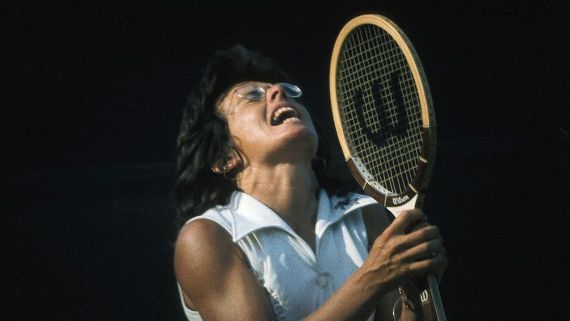Billie Jean King (shown here) announced her intentions, 70-plus years ago.
At 7, she says, she told her mother she was going to do something great. At 10, she “told my mom, ‘Mommy, I want to be the No. 1tennis player in the world.” At 12, she “promised myself that I would fight for equality the rest of my life.”
And then, remarkably, she did all of that.
Some of the result is clear in PBS’ “Groundbreakers,” from 8-10 p.m. Tuesday (Nov. 21), the eve of her 80th birthday. The documentary partly looks at King’s story – “I’ve had an amazing life, because of being in sports,” she said in a virtual press conference – and mostly looks at changes in life.
The film has four stars in their 20s – Naomi Osaka (tennis), Suni Lee (gymnastics), Chloe Kim (snowboard) and Diana Flores (flag football) – chat with four past stars. There’s soccer’s Julie Foudy, 52; track’s Jackie Joyner-Kersee, 61; basketball’s Nancy Lieberman, 65; and King.
The younger women seem startled by stories of low pay and scarce scholarships.
Foudy, for instance, was 1 year old when “Title IX” became law, setting the path toward equality in school sports. But when she went to college, full-ride scholarships for women were still rare.
“I was on the national (soccer) team already,” she said in the press conference. “Today, in that same position on the national team, I’d have 350 schools, probably, that I could get scholarships to.”
Her school, Stanford, finally gave her a full scholarship her senior year. Then came the battle over women getting paid by the soccer federation; that, she said, is when she met King:
“She goes, ‘Foudy, what are you doing? You, as players, let’s go.’ And in her Kinger fashion, (she said), ‘You have the power to do this.’
“I was literally flying into a national-team camp that next day. We were supposed to sign another $10-a-day contract. I said to the team, ‘I was just with Billie Jean King; she said we’re not signing this.’”
Foudy and Mia Hamm negotiated a new deal, amid a potential shutdown. “It takes guts,” King said.
King had already won the equal-pay fight for women’s tennis, part of a life of firsts.
She had been playing other sports, when a friend in 5th grade took her to play tennis. “I thought, ‘This is nice, but my dad’s a firefighter. There’s no way I’m going to be playing” at a country club.”
But then she heard of free lessons at a park. It was the start of a career that included 39 championships in Grand Slam events.
Her parents saw few of those matches … and few of the 534 games that her younger brother (Randy Moffitt) pitched in 12 Major League seasons. Her dad, King said, wouldn’t even ask if she’d won. “He goes, ‘It’s okay, as long as you tried your best’. I think if more parents would do that, it would be a lot better for their kids.”
But mostly, she won. That included the big one – a “Battle of the Sexes” against Bobby Riggs, seen by 30,000 people in person, 50 million on American TV and 90 million worldwide. King won in straight sets, 6-4, 6-3, 6-3.
Later that year, the U.S. Open made the groundbreaking decision to have equal prize money for men and women. A year earlier, Title IX had set the start of equality in school sports.
The next half-century would be complicated, setting up the careers of Kim and Osaka and others. “This is what I’ve waited for my whole life,” King said. “I’m glad I’m still alive to see this day.”

She’s led a revolution in women’s sports
Billie Jean King (shown here) announced her intentions, 70-plus years ago.
At 7, she says, she told her mother she was going to do something great. At 10, she “told my mom, ‘Mommy, I want to be the No. 1tennis player in the world.” At 12, she “promised myself that I would fight for equality the rest of my life.”
And then, remarkably, she did all of that.
Some of the result is clear in PBS’ “Groundbreakers,” from 8-10 p.m. Tuesday (Nov. 21), the eve of her 80th birthday. The documentary partly looks at King’s story – “I’ve had an amazing life, because of being in sports,” she said in a virtual press conference – and mostly looks at changes in life. Read more…